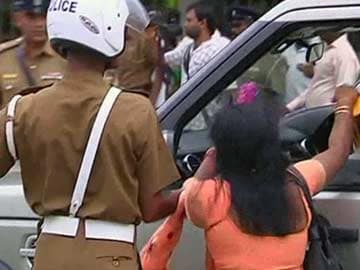
British Prime Minister David Cameron's motorcade was stopped today by Tamil protestors in Sri Lanka's Jaffna, a district which bore the main brunt of the country's ethnic conflict in 2009. 40,000 Tamil civilians were allegedly killed in the final days of the ethnic violence. At Jaffna's Kannagi camp for about 500 people yet to be resettled after their land was taken by the army 23 years ago, Mr Cameron walked though narrow, muddy rows of tin shacks.
Here are the latest developments:
Earlier, about 100 relatives of people taken into custody during the war and not seen since marched through Jaffna holding up placards reading "We want our children back". Some managed to break through a police cordon and surge towards Mr Cameron's car.
Mr Cameron later tweeted that some of the stories told by victims in Jaffna was 'harrowing'. He had said he would raise "serious questions" about the alleged torture and abuse of the country's ethnic minority
The British PM's Jaffna visit has reportedly rattled Sri Lanka after the top leaders of India, Canada and Mauritius missed the summit. Indian PM Manmohan Singh called off his visit to Colombo after strong demands from Tamil Nadu politicians, including three of his own ministers, to boycott the event.
Instead of Manmohan Singh, External Affairs Minister Salman Khurshid is attending the event. Mr Khurshid made it clear upon his arrival in Colombo that India's participation was not a dilution of its stand on Tamils in Sri Lanka.
Sri Lankan President Mahinda Rajapaksa today urged Commonwealth nations not to turn the grouping into a 'punitive and judgemental' body as he chaired a summit in the shadow of a dispute over the alleged war crimes against Lankan Tamils. On the opening day of the three-day Commonwealth summit in Colombo, Mr Rajapaksa made a combative statement about his country's battle against "30 years of terror."
"If the Commonwealth is to remain relevant to its member countries, the association must respond sensitively to the needs of its people and not let it turn into a punitive or judgmental body," the Lankan President asserted.
Several leaders in the 53-nation grouping are boycotting the summit after Mr Rajapaksa refused to allow an independent international investigation into allegations that up to 40,000 Tamil civilians were killed in the final days of Sri Lanka's ethnic conflict in 2009.
Mr Rajapaksa on Thursday said he was "satisfied" that Mr Khurshid was attending the meet. When it was suggested to him at a press conference that the Indian Prime Minister had skipped the event to respect Tamil sentiment, the president shot back, "But he has not said this to me".
Today, Mr Rajapaksa warned against other leaders trying to impose their own agenda on the gathering in Colombo. "We must also collectively guard against bilateral agendas being introduced to the organisation," he said.
The Rajapaksa government has denied the allegations and called them a campaign by rebel sympathisers to tarnish the country.

